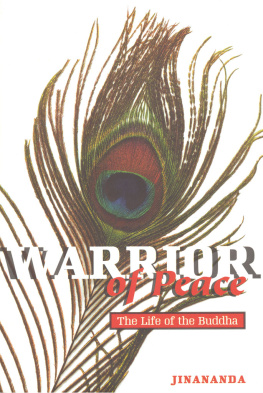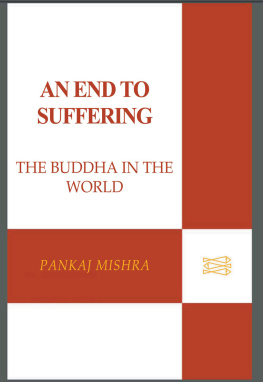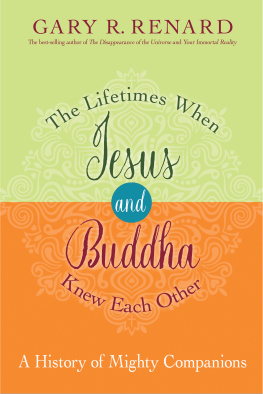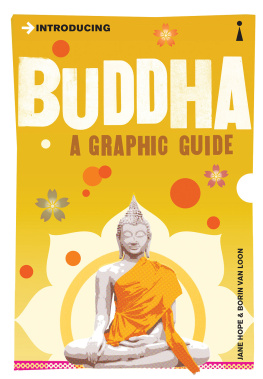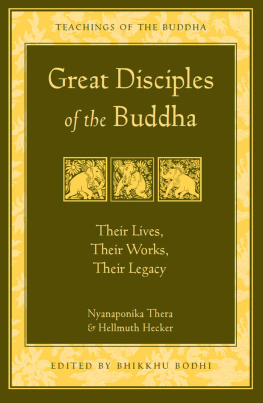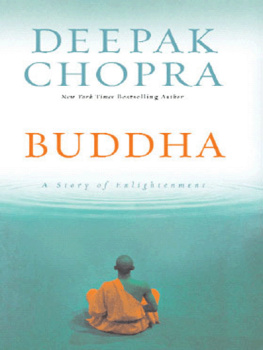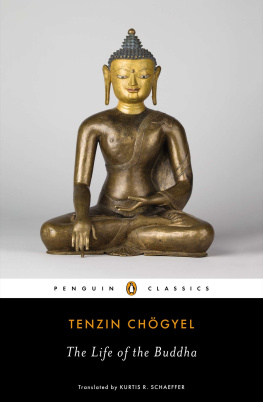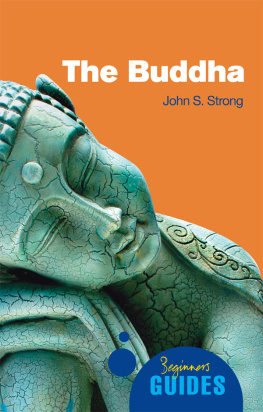Gautama Buddha. - Warrior of peace : the life of the Buddha
Here you can read online Gautama Buddha. - Warrior of peace : the life of the Buddha full text of the book (entire story) in english for free. Download pdf and epub, get meaning, cover and reviews about this ebook. City: Birmingham, UK, year: 2002, publisher: Windhorse Publications Ltd, genre: Religion. Description of the work, (preface) as well as reviews are available. Best literature library LitArk.com created for fans of good reading and offers a wide selection of genres:
Romance novel
Science fiction
Adventure
Detective
Science
History
Home and family
Prose
Art
Politics
Computer
Non-fiction
Religion
Business
Children
Humor
Choose a favorite category and find really read worthwhile books. Enjoy immersion in the world of imagination, feel the emotions of the characters or learn something new for yourself, make an fascinating discovery.
- Book:Warrior of peace : the life of the Buddha
- Author:
- Publisher:Windhorse Publications Ltd
- Genre:
- Year:2002
- City:Birmingham, UK
- Rating:4 / 5
- Favourites:Add to favourites
- Your mark:
- 80
- 1
- 2
- 3
- 4
- 5
Warrior of peace : the life of the Buddha: summary, description and annotation
We offer to read an annotation, description, summary or preface (depends on what the author of the book "Warrior of peace : the life of the Buddha" wrote himself). If you haven't found the necessary information about the book — write in the comments, we will try to find it.
A poetic and rousing account of the Buddhas life story, bringing together the strands of history, fact, traditional oral legend and symbolic myth.
Warrior of peace : the life of the Buddha — read online for free the complete book (whole text) full work
Below is the text of the book, divided by pages. System saving the place of the last page read, allows you to conveniently read the book "Warrior of peace : the life of the Buddha" online for free, without having to search again every time where you left off. Put a bookmark, and you can go to the page where you finished reading at any time.
Font size:
Interval:
Bookmark:

Published by
Windhorse Publications
169 Mill Road
Cambridge
CB1 3AN
www.windhorsepublications.com
Jinananda 2002
First Edition 2001
Electronic edition 2014
The right of Jinananda to be identified as the author of this work has been asserted by him in accordance with the Copyright, Designs, and Patents Act 1988.
Cover design: Alban Leigh
British Library Cataloguing in Publication Data:
A catalogue record for this book is available from the British Library
Paperback ISBN: 1 899579 32 X
ebook ISBN: 978-1-909314-47-4
Windhorse Publications would be pleased to hear about your reading experience with this ebook at:
References to Internet web sites (URLs) were accurate at the time of writing. Neither the author nor Windhorse Publications is responsible for URLs that may have expired or changed since the manuscript was prepared.

Jinananda, also known as Duncan Steen, was born in 1952 in Bedford, England. Brought up in the Church of England, which he enjoyed (thanks to the music and King James Bible), he took up Transcendental Meditation in 1970, and later studied Sakhya yoga in India, before discovering Buddhism in England. He was ordained within the Western Buddhist Order in 1986, when he was given his Buddhist name, which means Bliss of the Conqueror. Since 1990 he has worked as an editor for his teacher, Urgyen Sangharakshita. He is the author of The Middle Way: The Story of Buddhism and an English version of Sophocles Oedipus the King, both published by Naxos Audio Books, and Meditating, an introduction to meditation published by Windhorse. He has taught meditation and Buddhism at the West London Buddhist Centre for sixteen years.
The account of the Buddhas life that follows has been put together from many sources. If it has any virtues, they come from those sources. Its faults are all my own. Anything I have learned about Buddhism comes mainly from my teacher, Urgyen Sangharakshita, though I have taken inspiration and information from many other writers and teachers, some of whom are cited in a short bibliography, which I have restricted to biographical material about the Buddha. Translations from original texts have sometimes been simplified and abbreviated. I have used terms that are more familiar in their Sanskrit form, such as dharma and nirva, in preference to their Pali equivalents (dhamma and nibbna) even when quoting from the Pali.
I am grateful to Naxos Audio Books for permission to publish the text of the first part of The Middle Way, which forms the basis of this book. I must also thank Siddhisambhava, Dharmachandra, Ruchiraketu, Kulananda, and Jnanasiddhi, for encouragement and criticism, and the Windhorse editorial team, Vidyadevi, Padmavajri, Pabodhana, Dhivati, and Portia, and Dharmashura and Jnanasiddhi (again) for giving me the time to revise the text. Special thanks go to Ashvajit, for graciously and unsparingly applying his keen nose for dubious views to the book even while it was careering towards the final stages of preparation for publication; and as always to Shantavira, the magisterial buffers of the Windhorse editorial process.
Jinananda
West London Buddhist Centre
March 2002
This book is dedicated to Nicolas Soames,
with affection
If you come to think of it, what a queer thing Life is! So unlike anything else, dont you know, if you know what I mean.
P.G. Wodehouse, Rallying Around Old George
On a full-moon night of terror and magic and transformation, a dark, skeletal figure sits under a tree by a river. He is just bones and sinews, skin and rags, his face a bearded skull, his eyes like burning coals at the bottom of two dark pits; and he is totally alone. At first sight he might seem to be just another piece of human wreckage thrown up in this place by a pitiless world, except that there is something lordly about him, an air of self-command and confidence, as if he knows precisely what he is doing and where he is going. Yet the truth of what occurs on that night is something that can never be explained, it is humanly inconceivable, and the next day the man is no longer there. In his place is the Awakened One, the Compassionate One, the Revealer of the Way to the heart of the mystery of life. What he knows is eternally unknowable, though it is before us in every breath we take. He will be called the Buddha, though he will be seen by no one. He will teach for fifty years, and he
No one who saw the gaunt, ragged figure, sitting motionless day and night, would have seen anything out of the ordinary. Meditating ascetics were not an unusual sight in northern India in the fifth century BCE , any more than they are today, yet we have all seen images of this particular man sitting, legs crossed, eyes lowered, during those days and nights. There is decisive energy in the unshakeable poise of his posture, ineffable wisdom and fathomless compassion in his half smile.
This image remains, two-and-a-half thousand years later, the archetypal symbol of the spiritual quest. When nothing seems to make sense any more, it is his face that looks out at us with the assurance that there is another way. At about the same time as Greek philosophers were laying the foundations of Western science and philosophy, this man sitting beside that river on that night in ancient India was also demystifying the quest for truth. What he shared with his Greek contemporaries was a concern to explore fundamental human values based on an appeal not to the authority of God or revelation or holy books, but to reason and experience. The Buddha was plain and open in his methods:
Give me any reasonable person, who is sincere, honest and straightforward, and I will teach them the Dharma.
Dgha-Nikya 25.22, Udumbarika-Shanda Sutta
Buddhism, like Greek philosophy, arises out of a resolve to focus on essentials. It arises out of an understanding that life comes before religion that one is a human being first, and a Buddhist or anything else second. What, then, is so significant about what the Buddha had to say? Why was he accorded the title of Buddha, one who is awake?
What the Buddha uncovered is a natural training programme natural in the sense of being based on an innate human capacity by which anyone may turn their life around in order to explore and realize for themselves the ultimate nature of things. This is one way of describing what Buddhists believe he achieved that he opened up the possibility, for anyone who makes the effort, of solving the riddle of life, not as a philosopher or a scientist, but as direct human experience. He offered a definite achievable goal for ordinary human life; in fact, he saw it as the only goal of a truly sane human life. And because this goal, this solution, was not theoretical, because it flies under the radar of all the ways in which we communicate and evaluate our experience, to speak of it in this or in any other way can be true only up to a point.
In some sense this was his message. What he came up with was not only a system of practice, but, more importantly, a clear perception of the truth of things as a straightforward practical affair, which only becomes complicated when we dont take it up as a practice, when we dont give ourselves to it. This, of course, runs entirely counter to the spirit of our information age. Information is power, it is said, and in some subtle way that is always what we want from the information we seek. We want to be in control of that power, rather than give ourselves to it; we want the use of the truth, not its practice; we want to find the truth out there, not bring it to birth from within; we want to be titillated by the truth, not transformed by it.
Font size:
Interval:
Bookmark:
Similar books «Warrior of peace : the life of the Buddha»
Look at similar books to Warrior of peace : the life of the Buddha. We have selected literature similar in name and meaning in the hope of providing readers with more options to find new, interesting, not yet read works.
Discussion, reviews of the book Warrior of peace : the life of the Buddha and just readers' own opinions. Leave your comments, write what you think about the work, its meaning or the main characters. Specify what exactly you liked and what you didn't like, and why you think so.

